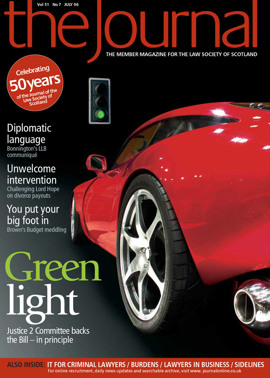Challenging times

It was a great privilege to be involved in the Society’s Donald Dewar Memorial Debating Tournament, which marked the final of a field of 152 Scottish schools. The competition, at the Scottish Parliament, debated the motion “This House Believes Too Many People Attend University”. Two very talented pupils of Dollar Academy won the competition, for the motion, showing a standard of debating that, as the Presiding Officer said, rivalled some of the debates held there on a daily basis.
I also had the pleasure of welcoming new solicitors to the profession at an Admission Ceremony, and recognising their enormous hard work and achievement as well as the support of their families. In his address, John Elliot, the Deputy Keeper of the Signet, pointed out not only the benefits and challenges of becoming a solicitor but also the importance of achieving a balance between work and non-work (usually described as “life”).
Evidence to the Justice 2 Committee of the Scottish Parliament on the Legal Profession and Legal Aid (Scotland) Bill culminated in the committee’s report on 30 June. The committee have worked hard on a challenging task and their report raises a number of questions which the Society has also been asking of the Executive on the cost, independence and human rights compliance of the proposed Commission. It is important that those questions are answered and that any legislation is workable and effective. The report also reflects the evidence of Hugh Henry, the Deputy Justice Minister who stated that conduct complaints (which the Society sees as one of the mainstays of a robust profession), should remain with the Society. A stage 1 debate is expected in early September. The Society will continue to update members and all those interested in the bill and encourage continued involvement in this important debate.
Independence of the legal profession, particularly on sentencing and judicial appointments, is another debate which continues both north and south of the border (and on the latter, it was interesting to read one commentator quoting the late Tony Hancock: “Magna Carta – did she die in vain?”).
The six-monthly meeting in Dublin of the chief executives and office bearers of the Law Societies of Scotland, England and Wales, Northern Ireland and Ireland also focused on independence. All the Law Societies are facing various levels of reform and whereas these are welcomed in part by the Societies, there is concern at their overall impact given the important constitutional position of the legal profession. These concerns are shared by lawyers, clients, related organisations and the media who are wary that the roots of our democracy may be weakened by the erosion of independence of the law. The level of concern has led the Society to hold a debate on the independence of the law in early September. Speakers will include Sternford Moyo, a former President of the Zimbabwean Law Society, Professor Sir David Edward, KCMG, QC, formerly a judge in the European Court of Justice, and Lord McCluskey, the former judge and Solicitor General.
There has been extensive media coverage of the announcements by many bar associations and faculties to refuse to act in sexual offence cases from August unless the Executive increase their offer of interim rates under the current legal aid scheme. The First Minister strongly criticised this, announcing that, if necessary, the Public Defence Solicitors Office would be used to ensure that accused individuals are represented. Talks with the Scottish Executive have taken place and it is hoped that a suitable solution can be found quickly in the interests of everyone concerned.
In England, the Legal Services Reform Bill was published, accompanied by statements from Lord Falconer who was clear that the provisions of the bill raised the risk of reducing consumer choice and might have an adverse impact on access to justice. The risk, he stated, would be mitigated by expected changes in the provision of legal services. It was said, quite bluntly, “this could have serious implications for those consumers in rural areas if those larger legal firms do not consider it profitable to spread their service provision to those areas”. This seems a remarkable gamble to take with access to lawyers and is one that hopefully the Scottish Parliament cannot endorse for Scotland.
I welcome and encourage the engagement and involvement of the profession on the important issues in the proposed legislation, the wider issues of the justice system and the independence of the law in Scotland.
In this issue
- Challenging times
- A block on service
- Revving up for debate
- LLB confidential
- Clean break under attack
- The hokey-cokey Chancellor
- Switching channels
- The Chancellor gets it REIT
- Executries sponsored feature
- The EU and the criminal
- Case for the defence
- To act or not to act... that is the question!
- A summary matter
- Ireland 4, Italy 0
- The route ahead
- Scottish Solicitors Discipline Tribunal
- Website reviews
- Book reviews
- Is that burden dead yet?






